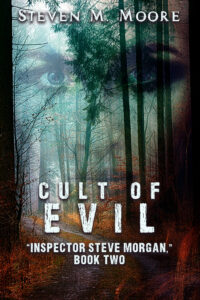Mysteries and thrills but not horror?
Stephen King and Dean Koontz have made a good living writing horror stories. (The second’s tales are better than the first’s.) Other authors less so. (Maybe not so good a living but still some quality stories in that genre?) All their stories are probably better categorized to be a subgenre of fantasy and not sci-fi.
Mystery and thriller stories do a better job of capturing the actual horror of real life, though. What could be more horrible than a school shooting? Or Putin’s war in Ukraine? Or 9/11? Moreover, fiction dealing with horrible events can provide useful warnings for us precisely because those events could occur in real life!
 Even in my sci-fi stories, I prefer mystery and thrills, not unbelievable horror. You won’t find an ET like the one in the movie Alien, but you will find some scheming and murderous ones. I prefer mystery and thrills in my reading, and I prefer to create them in my writing to creating some fantastic story featuring impossible events.
Even in my sci-fi stories, I prefer mystery and thrills, not unbelievable horror. You won’t find an ET like the one in the movie Alien, but you will find some scheming and murderous ones. I prefer mystery and thrills in my reading, and I prefer to create them in my writing to creating some fantastic story featuring impossible events.
My new novel Cult of Evil has enough horror that it should still creep out a lot of readers, though, especially because such horror could actually occur in real life. The story takes place in the Bristol conurbation of England (Britain’s west coast), but it could easily occur in any port city anywhere. The novel also differs a bit from my other mystery/thriller novels, the first novel in the series included, because it’s more a police procedural featuring Inspector Steve Morgan, also the principal character in Legacy of Evil and making his debut as a secondary character in The Klimt Connection. In contrast to crime stories set in America (Detective Bosch in LAPD and my own Detective Castilblanco in NYPD, for example), the police procedures are English ones, but there’s a lot of surprising commonality between LAPD and NYPD versus Bristol PD. Morgan himself has things in common with the two mentioned American detectives (a military background, for example), but there are also quite a few differences.
Cults, of course, are very real, from L. Ron Hubbard’s crazy scientologists, Quakers, and Seventh Day Adventists, to David Koresh’s and Charles Manson’s fanatical groups and those QAnon believers that plague American democracy. From these examples, one sees cults can be good or bad. Of course, Morgan has to deal with an evil one.
I hope you find the horror in Cult of Evil subservient to the mystery and thrills. I also hope you find it more interesting than what’s contained in a King or Koontz novel. Let me know if you do.
***
Now available! Cult of Evil, Book Two in the “Inspector Steve Morgan” series, was published October 17 and will be available at all of Draft2Digital’s affiliated retailers (Apple, B&N, Kobo, etc.) and library and lending services (Overdrive, Scribd, etc.), but not on Amazon. Here’s a summary:
Steve Morgan, a former Scotland Yard Inspector and now one at Bristol PD, has another murder case to solve. A young woman appears to have been tortured as part of some cult’s evil rite and then hung lifeless from a Victorian folly. Is the cult leader the scam artist who took over the woman’s properties and other valuable assets? And to make matters even worse for Morgan, a deadly assassin is hunting him.
While you can read this novel independently from my others, if you missed The Klimt Connection (where Morgan makes his debut), Celtic Chronicles (which leaves some things unresolved for the first Morgan book), or Legacy of Evil (#1 in the series), you might want to check them out too.
Around the world and to the stars! In libris libertas!
